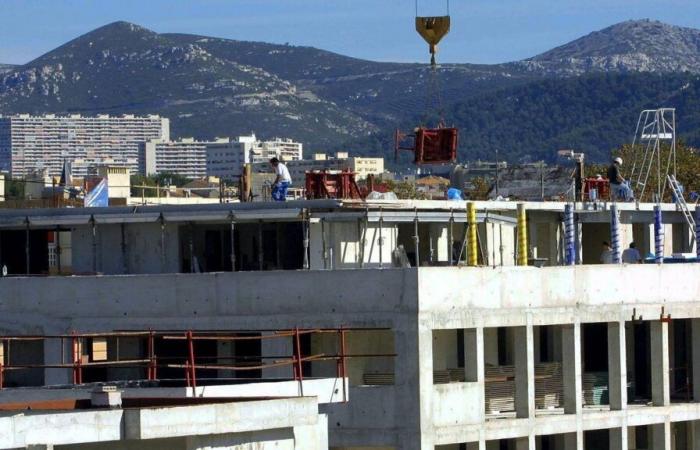A hard blow, one more. The announced end of the Pinel system, which will not be renewed in 2025, should not help the housing crisis in France. “Don't throw any more away, the cup is fulllaunches Arnaud Bastide, president of the Federation of Real Estate Developers (FPI) Provence. For the government, it is a question of dogma: we must no longer help the evil private landlord. »
Because this system, established in 2014 by the Minister of Housing at the time, Sylvia Pinel, was, in fact, intended to support new construction and boost the rental market in tense areas, by encouraging investment. Concretely, a purchaser of a new apartment, located in a tense area, who agreed to rent it for a certain period (6, 9 or 12 years), benefited from a tax reduction (12, 18 or 21%) of the amount of the acquisition (up to a maximum of €300,000).
And the 2023 revision did not make the offer any less attractive: buyers had to turn to Pinel+ housing (more quality) or located in priority neighborhoods of the city (QPV) in order to maintain the same tax advantage, while Discount rates were slightly lowered on now defined classic Pinel goods.
Pinel rents still too high
On the other side, it was also interesting because the rent was capped and aimed at certain households subject to income conditions. On paper, at least. Because “the effectiveness in terms of accessibility was not as important as expectedregrets Cherifa Laidani, director of the association for the defense of consumers and users CLCV (Consumption of housing and living conditions) of Bouches-du-Rhône. Pinel housing rents remain too high and are not accessible to enough Provençals. We even see apartments under the Pinel law with the same rents as others under traditional rentals. And many of these homes have remained vacant.”
In Provence-Alpes-Côte d'Azur, the third most populous region in France, just over 16,000 housing units were built in 2024, knowing that 79% of the population is concentrated in the four major urban areas (the metropolises of 'Aix Marseille, Nice, Toulon and Avignon), all located in Pinel eligible zones (A and B1), according to FPI Provence. Nationally, just under 200,000 homes were acquired via the Pinel system between 2014 and 2017, or 48% of new homes, according to a joint study by the General Inspectorate of Finance and the Inspectorate general environment and sustainable development.
The fear of professionals in the sector is that without the Pinel system, properties on the rental market will become scarce. “Investors will put their money elsewhere, so builders will no longer build and there will be an even greater shortage of housing.prophesies Didier Bertrand, Paca president of the National Federation of Real Estate Agents (Fnaim). However, we have calculated that 400 to 500,000 new housing units are needed per year in France, whereas for years, we have been producing 200 to 250,000. »
“As many homes built in 2024 as in the 1950s”
What Isabelle Lonchampt shares. “By 2024, we will have built as many homes as in the 1950s, even though there are 8 million more householdsestimates the regional president of the French Building Federation (FFB). The government only sees the tax loophole which costs it 38 billion euros, while it brings in between 50 and 60 billion more in various taxes. The sector is in crisis for several reasons and I wonder how it would have happened without the Pinel law…”
She will have her answer in January. Because the new Minister of Housing, Valérie Létard, assured that the Pinel system would be completed and not replaced, estimating however, in the columns of Parisianwhich “rental investment must be supported” and claiming to be attentive to “proposals from parliamentarians to find avenues for transition”. Arnaud Bastide thus evokes “the status of private lessor allowing you to be taxed less” while Cherifa Laidani imagines that it would be necessary “help investors more but force them to charge lower rents”.
With the withdrawal of the Pinel law, Arnaud Bastide is convinced, “we are in the process of removing the incentive nature of real estate”. Its extension was however part of the requests of the FFB or, the leastits replacement by another device. The deputies did amend the 2025 finance bill in order to postpone the deadline for signing the act of an investment in Pinel to March 31, 2025, but it is not certain that this appears in the final version. “We need investors, we can't just count on owner-occupiers, we also need rental propertieshammer Isabelle Lonchampt. We have long been asking for something lasting for landlords, not for large companies..”
On this point, the representative of the tenant defense association agrees: “The system must not disappear but be reformed to take into account local issues and standards of living. We want middle-income households to be able to rent an apartment and for that we have to focus on something sustainable. Because there, we especially see the demand for social housing increasing…”
This fear of no longer being able to find housing, Didier Bertrand affirms the “feel every day”. “We face two problems: the lack of housing on the market and the lack of means among households. Every day, tenants ask me to help them. I have received many students who ultimately give up on their studies because they cannot find a roof over their heads, it hurts their hearts and their stomachs. We are threatening the future of our country.”
And the expansion of the zero-interest loan, which is part of the measures envisaged by the government to revive the property ownership market, will not compensate for the growing shortages in the rental market.






